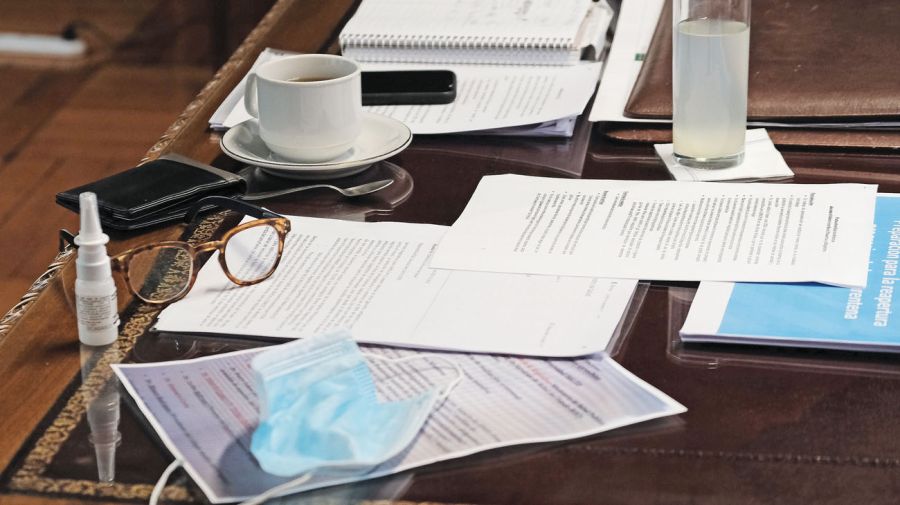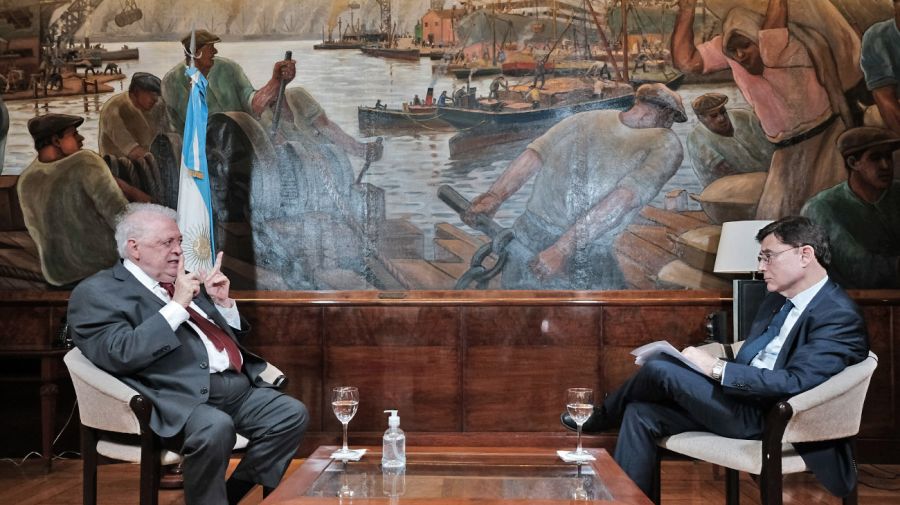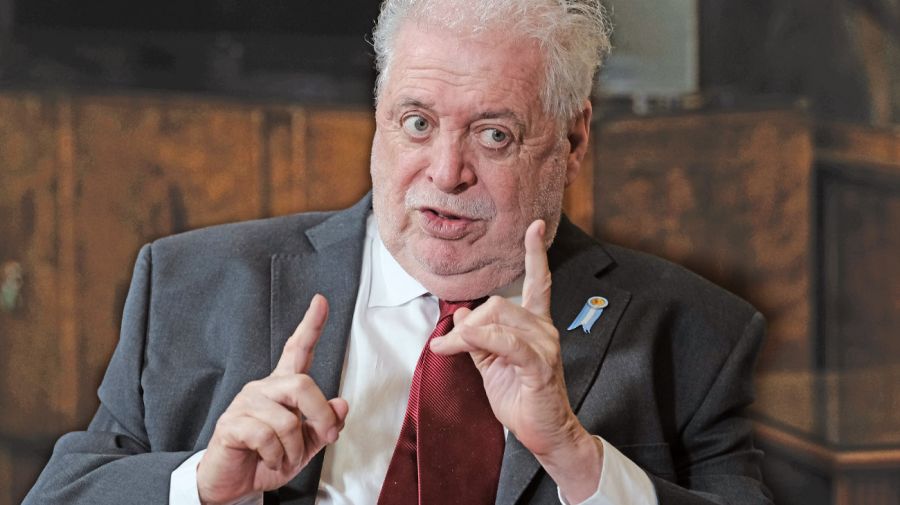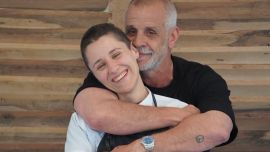He served as health minister during Argentina’s three most severe crises 1989, 2001 and now. He’s the protagonist of the Alberto Fernández administration’s most successful policy to date: the battle against Covid-19. The president thanks God for having him as minister. But, Ginés González García, will Argentina set a world record with the duration of its coronavirus quarantine?
COVID-19 & THE HUNT FOR A VACCINE
Faced with a new virus, a certain ignorance is logical, but I’d like to start by running over why there have been so many contradictions, even from the World Health Organisation (WHO). They said that the virus would not arrive in summer, then that face-masks were useless and then that testing was unimportant. What’s your explanation?
Yes, it’s curious because there has never been so much technological advance and innovation and at the same time so much uncertainty and contradiction.
I’d attribute that to a certain lack of WHO leadership plus a clear geopolitical clash between China and the United States, with the information system of one undermined or countered by the other. There’s been a blame game over what happened and a battle over who’s handling the situation better, who’s finding the best reagents or who’s closest to a vaccine and that’s going to go on happening.
What’s truly surprising is that the only real prescription is one predating the Middle Ages: quarantine. Everything else contains contradictions and that must produce a lot of uncertainty in people, but I trust that won’t last long. I believe in innovation and in the whole global scientific system pulling together behind this – and not just for humanitarian reasons of solidarity.
Also the selfishness of the butcher or baker, as Adam Smith might say.
There’s also an enormous mega-business behind finding a solution and it will also be a huge political success for whoever finds a vaccine.
It’s like the Moon landing: a race to see who arrives first.
This week I told the WHO World Assembly [held via video-conference] that it was great knowing that the vaccine would take a certain time but not long, if you look at how the research is advancing. I also said that just as or even more important than discovering a vaccine was a global alliance to produce it.
So many people need the vaccine that no manufacturer can produce the necessary quantity. And when that happens, it should be at a reasonable price, let’s not enter into questions of patents and absurd prices which would mean many people not having access to the medicine. Not many countries have spoken about these things but they seem central to me. And we must take advantage of this collective solidarity and this global exaltation, including that fragility felt by countries in the face of that uncertainty produced by these changes. I hope that happens.
Would the ideal thing be the patent being paid by the USA or the United Nations and then applied without cost?
Many years ago at an assembly I proposed that each country contribute money proportional to its Gross Domestic Product in order to have mass access to innovations. Today the market manages innovation – that’s why there is so much research into some illnesses and very little into others. There is no research into the illnesses of poor people even when massive nor into acute diseases. Why’s that? It’s because they’re short-term remedies.
They’re not profitable.
That’s why they look more into chronic illnesses. The market was always more of a price than value system. It cannot orient scientific research but that’s what has been happening for many years. That’s my battle. I’m a professor in medicamental policies but it’s not a battle which is going well for us internationally, not even in previous pandemics. In the previous administration we had bird flu with pandemics and collective risk and already then it was very difficult to introduce any concept of the accessibility of a universal good, of the public use of knowledge.
There was no vaccine for bird flu nor SARS.
No.
In this case there might be because it affects many more people. Following economic logic, there is more interest and research dedication.
Besides SARS began with a certain fall-off never fully explained and went away without therapy nor vaccine but it was a medicated illness, a more effective medication than there is now for coronavirus.
But never a vaccine.
No. It’s food for thought that the great epidemics of humanity disappeared without therapy.
By themselves.
Today we don’t know exactly what the Black Death was. It was a disease which decimated humanity, leaving its name for all other plagues. There was actually a vaccine for smallpox but only towards the end. The real conquistador in the Americas, to be exact, was smallpox. The Aztec empire had 22 million inhabitants and was reduced to two million by the illness, decimated. Measles was similar but on a lesser scale. Those diseases were atrocious. Leprosy, for which there is still no real therapeutic alternative, also became what it was in the Middle Ages, it was the classic mediaeval disease. Diseases have their cycles. It’s all biology; the virus also moves and accommodates to these things.
The Black Death killed 200 million people, smallpox 56 million and Spanish flu 45 million but since then always less than a million. Might we conjecture that after a certain point the immunological system produces defence mechanisms?
Yes, or else the virus also mutates.
But prior to the mutation of the virus, is the solution that the immunological system finally develops antibodies to neutralise it?
Yes.
Could that also be the solution in this case?
The therapeutic line being sought has to do with that. It’s linked to the stimulation of endogenous and exogenous antibodies.
There are two lines of research which are very advanced in Argentina. One is to look at the antibodies formed by those who have had the illness. This is leading to treatment with the plasma of a sick person, which has many antibodies. Nothing definite yet but the results seem promising.

There is another far more massive study which proceeds from horses being great producers of antibodies. There is a protein extract from the virus which, when isolated, forms antibodies – not the disease but antibodies by generating the reaction of the organism. This is being injected into horses and the preliminary results are promising with potential capacity for being applied. That is being done by two Argentine laboratories in public-private partnership. This is another very interesting aspect of what’s happening now. All my life I’ve striven for that kind of alliance. Argentina always had too much classic research and too little applied. Perhaps one of the benefits of this pandemic has been to stimulate, by brute force, the course of science and public-private partnerships towards applied research – for reagents, diagnostic tests and therapy.
Might the virus be more malignant in people’s minds than in their bodies? Unlike other pandemics, it is being built up by the media and generating enormous social tension.
I don’t know if it’s in the mind. What I am sure of is that it is linked to the modern world and its transport, closely related to the movement of people.
There’s discussion regarding the number of people who are going to die because their heart problems go unattended or because they are afraid to go to hospitals due to the chance of contagion, even comparing the number of deaths avoided by the quarantine with those produced by not attending other illnesses.
The Instituto Favaloro will be closing down two of its centres, one in this city and the other in Pilar, because people are not going there for their clinical studies. How do you see the secondary and collateral effects of the virus?
That’s clearly an undesired effect. If you’ve been following me a bit, you will have observed that I began saying about two or three weeks ago that we cannot discontinue any treatment. We have to tell people that if they have any symptom, they should not stop coming, that the medical establishments are safe and that they should first ring up their institution or their doctor to make an appointment and they’re doing that.
At first we advised that pre-scheduled surgery should be postponed but fear led to all surgery being postponed. We have tremendous idle capacity in our health structures with over half of public or private beds vacant today in Argentina. Those intensive care beds, so critical all over the world, lacking in New York and lacking in Italy and producing those tragic options between “this one yes and this one no,” in our country we’re a long way from that. We’ve added beds and how. Without boasting I’d say that there was almost Chinese growth in these two months. We Incorporated 2,500 intensive care beds, with artificial respirators and with monitoring and all other equipment. Today we have over 6,000 beds of that kind standing empty. Some neighbouring countries have no beds or are reaching their limit while our situation is very comfortable.
If I turn to the numbers, the total mortality this year is much lower than last, firstly, because all diseases via respiratory transmission have been diminished by the quarantine. What we’re doing against this virus works for all the other respiratory illnesses, which start becoming complicated at this time of year. Traffic accidents have fallen away sharply. Thirdly, the deaths from surgical risk have dropped because with less surgery there is also less post-surgical mortality. But this cannot be eternal. We’ve got to go back to doing what has to be done and not interrupt treatments. If there is a symptom, people must go promptly.
I also believe that in some provinces it will be quicker. In some provinces the disease is starting to become a remote question. In over half of Argentina’s provinces there has been nothing for several weeks.
You have alluded to three-quarters of the territory in terms of area.
There are several Argentinas. Today we have to consider them as different. We cannot say the same about Greater Buenos Aires, which is clearly more unequal than the rest of the country. But it’s also difficult to say more because it is a problem of prevention. Nobody values what did not happen as it is impossible to measure the deaths that never were. What’s real is the figures we have. We know what would have happened if we had followed the curve as it was and what happened in the countries which acted otherwise.
The director of the Argentine Institute for Epidemiological Research, Roberto Chuit, has given us estimates that without quarantine, 40,000 Argentines would have died from coronavirus
Although I don’t like to say a number, I know it would have been many Argentines. We have avoided many tragedies, which is what we set out to do.
We said from the start that it could not be halted – a pandemic is a pandemic. The virus arrived and will keep on arriving. In this context, we are firstly trying to reduce the arrivals, hence all the limitations implied by closing down the frontiers and quarantine. Secondly, to diminish the consequences so that there are beds and all the known medicine available for everybody within an organised system working as a network, as now, with operational committees for every province - at times there are several per province coordinating all this because the coordination of all the resources is much of the work. From the start I said that this was a public matter, that the beds had to be available, regardless of whether they are private or belong to the state.
Nobody is expropriating anybody, simply placing resources where they are needed. I’m proud of that. What has happened in the health system in these two months sometimes takes years and it wasn’t easy because technology was being incorporated into the coordination and integration.
We were saying that 40,000 deaths have been saved. But comparing with the 2001-2002 crisis in Argentina or in Greece 10 years ago and other international studies on increased cancer in situations of economic crisis, it has been calculated that over the next four years rising poverty would increase the deaths from heart disease by 19,000, from cancer 3,700, from child mortality 2,700, etc. thus again arriving at a figure of 40,000, in reality more like 50,000. Granting that statistics always have their limitations and even more so when projected, might not saving 40,000 lives today generate via a socio-economic crisis the loss of 40,000 lives in the future? This is not a criticism because if it had been my decision, I would have prioritised today’s lives but I’m looking for an explanation. How would you explain to your post-graduate students the dilemma between present and future deaths?
The primary ethical responsibility, over and above any economic consideration, is to stop death and if it does come, as little as possible. That is what we are doing. We are also working to have less economic consequences lying ahead. Opening some industries in recent weeks has to do with that. We are attempting economic recovery in a country which was already destroyed. It’s not just the quarantine that stopped everything.
But it helps, of course.
Economy and health are a marriage. Environmental, economic and social conditions will always have their impact. Of the 47 most common diseases of the human species, 46 are more frequent among the poor than among the rich. Only one is more common among the rich than poor – skin cancer due to sunbathing. The impact of all these diseases is much more important in poverty. But it’s also true that one’s ethical obligation is not to make options – you save everything you can. In this sense, we never doubted that we should not forget anything and then see what is to be done. That’s why I say we have to return to industrial activity and what is being done there seems correct to me. The central problem there is transport – people should either go to work individually or be brought there directly by the employer with all the preventive measures. Within the factory, the worker is no worse off than at home or better because his temperature is taken upon entry for fever, respecting the conditions. Indeed the food and pharmaceutical industries have been working full steam without any kind of problem and with no cases. What’s ahead is a cycle with great individual responsibility, not so much observing quarantine as well as possible but heeding social distancing, working remote as much as possible, all those things which they place in our heads today and we are inclined to follow. That’s the other magic of these times, that we have followed the rules without being a Southeast Asian government, without Confucius. The compliance here is notable. Something to ponder for those believing that we Argentines never obey rules.
In the next few years there will be an increase in other causes of death due to rising poverty, what will be done with public health? You became minister with Eduardo Duhalde and then Néstor Kirchner in the crisis of 2002.
I’ve always had the honour of being minister in very critical situations. I was under Antonio Cafiero with 3,600 percent inflation.
In Buenos Aires Province between 1988 and 1991 during the hyperinflation...
Which meant that President Raúl Alfonsín had to go. The early inflation under Carlos Menem was also terrible. It’s not easy having to buy amid hyperinflation in order to keep hospitals running. The second time was with Duhalde when the meltdown was so great that you did not know where to look to evaluate the impact and see what other countries had done. I then looked at the Russian crisis of 1993-1994 and that made my flesh crawl because life expectancy went down by four years with the population submitted to very harsh situations. One of my big satisfactions is that this did not happen with the brutal crisis of 2002. Some of our statistics were not the best but in general terms the impact on lives – on the number of deaths and illnesses – was not significant. I hope that happens now.

QUARANTINE, FACE MASKS AND SOCIAL DISTANCING
Let’s get down to concrete issues in Argentina. Will the quarantine in the AMBA metropolitan area continue until the end of June?
(Silence) I don’t know.
Is that a plausible hypothesis?
That depends on how the cases evolve. At the start we said that there was one population group which we were looking at most, which was travellers, because the virus did not travel alone. After the travellers, the most vulnerable people [are those] in close contact with the travellers, the family. The most vulnerable were those persons whose age or previous pathology made them need special care. Afterwards, always bearing in mind that this was very important, we began to pass to the most vulnerable institutions: prisons, retirement homes, mental hospitals, places with prolonged stays. And now we’re entering into a new phase – I don’t know if it will be the last – with the most vulnerable neighbourhoods, those with a brutal density of population. I was surprised to find out that the place with the biggest density in the City of Buenos Aires is Villa 31. I would have said Belgrano or one of those places with enormous high rises. In shantytowns social life is in the street with permanent contact and everything shared, not just the room but often the bathroom and kitchen. The potential for dissemination and rapid expansion is thus very great, which is what has happened in the last 10 days in the City of Buenos Aires. That obliges us not only to treat, focus and isolate those areas along with all the other things technically required – there is the extra problem of social circumstances making isolation much more difficult.
But is it probable that Argentina will end up having 90 days of quarantine and become an academic case study at world level?
Are you referring to AMBA? In any case it’s not as rigid now as at the start. You look down the street and the situation is completely different. But if you’re talking about no classes or no public administration, something like that will probably happen.
I don’t want to dodge your question and the answer is that it depends on the number of cases. That’s why we talk of “day by day.” We’re advancing with one foot on the brake, not taking any measures without a foot on the brake.
Could there then be classes in the interior?
We’re starting to evaluate that. In the next few weeks some provinces will give it a try. But one thing which keeps me awake at night is that while it is true that social distancing is now being applied very well and was necessary in very peremptory terms, it carries the problem of increasing inequality. The explanation is that the educational component is one of the last main instruments where equality is lacking in Argentina. Not all poor homes have Internet or computers and, above all, not all have the family component to help the kid studying remotely. That help is available in the middle classes, I see it with my own grandchildren. Mothers are working hard and there the teacher component is not irreplaceable for the family. That scares me a bit. And it’s true that in some places there are no cases in the rural schools. It’s also tricky when you have the teacher unions. It seems to me that the segmentation used for industry, traffic and the shops should be applied to schools but I’m straying beyond my area.
Wouldn’t it be logical for policies of every kind, not just health or education, to bear in mind that there are two countries, AMBA and the rest, even if saying so might be ugly?
I agree, that’s the reason for the segmentation we are proposing because the measures were not the same in every province and some provinces have a much greater capacity to determine their own sanitary protocols. It’s also true that should something happen, they can backtrack more quickly, as was the case in Córdoba.
Will face-masks have to be used until a vaccine is found?
The face-mask prevents those who are sick from transmitting, that much is true. There has been fake news in that sense in recent days, claiming that the WHO has said that they are useless. If you do the rounds of the media, you’ll find a bombardment of crazy, scary things but beyond all that, there is confusion and a lack of leadership over what is happening and where we are going - something the state tries to avoid all day long. I try to speak as much as I can with an interview every morning and every afternoon, I can do no more. Sometimes some colleague of yours gets annoyed when I have to postpone.
But to return to your question, the situation will be variable. Unfortunately, the last place to go back to normal will be AMBA. The face-mask has an effect of social discipline – you put it on and see when others don’t.
Ethical more than medical?
In that sense it doesn’t seem bad to me with the reference that the smallest children should by no means be obliged. I note a massive use of the face-mask with much social control over people, which is also needed for social distancing, for which a series of things are absolutely necessary. Face-masks and social distancing are totally necessary.
What guarantees are there for a person who might or might not have fever and also be asymptomatic?
In general, when there is a fever of that kind in Buenos Aires, it’s either dengue or coronavirus, more likely dengue. I remember that when I started as minister my obsessions were dengue and measles. Look where we are now. Every time I referred to dengue, they told me that I was trying to distract attention from coronavirus. The advantage of taking temperatures is that it is a very easy procedure.
But does it serve to diagnose dengue more than coronavirus?
No. I just mean that when there is a massive fever, it’s more probably dengue. There’s a lot of dengue in Buenos Aires. A lot.
Have you done the [Covid-19] test yourself yet?
No.
And the president?
I’m not his doctor.
In Brazil it is discussed whether [President Jair] Bolsonaro should be tested or not.
There are many discussions with Bolsonaro. Neither the President nor myself are in the groups which have to be tested. We don’t have to do it just because he’s the president and I’m a minister.
Who would have to be tested if the quantities sufficed?
We only test with given characteristics. There is no shortage. We have loads of tests.
If you could discover via a test whether somebody is a carrier of the virus or not, wouldn’t that be more effective than taking temperatures?
It also costs US$8
So from the economic viewpoint it would be impossible?
It’s getting cheaper. National technology is being incorporated. If at first it cost us 4,000 pesos, now it’s less, closer to 2,000.

POLITICS AND THE PANDEMIC
Let’s wade into political waters. You’ve been Health minister to three presidents: Eduardo Duhalde, Néstor Kirchner and now Alberto Fernández, as well as with Antonio Cafiero at Buenos Aires provincial level (1988-1991). You’ve set a record for longevity – not even Juan Perón’s mythical Health minister, Ramón Carrillo, was that many years in the ministry.
I’ve been lucky but also somewhat dissatisfied. I’d like to have made more changes in the health system. I see a potential for transformation. I’ve done things which were only feasible in a context of crisis such as, for example, policies against cigarette smoking and the Law for Prescribing Medications by their Generic Name (Ley 25,649), which put an end to brands and competition by brand not price.
Does coronavirus open up great possibilities for the Argentine health system?
Yes. It is also my illusion to be able to make changes after so many years of people saying that the system is fragmented, unfair and spends a lot of money badly, things which I have also repeated. We face the opportunity to work. I’ll let you into a secret – I have a group from all sectors who are not officials and who are working to see how we can reform. I don’t want to bring it to light because it would be punctured by the sectorial tussle. But we must think big like that, what benefits may result after the crisis we’ve undergone.
You have defended Carrillo from the accusation of being a Nazi-lover, saying: “Dear Ramón Carrillo, forgive them, it’s the old hatred of the national and popular reappearing.” What did Carrillo do to make him a myth and why wasn’t he a Nazi-lover?
I have approached the families of two Argentine founding figures of different political origins – one, Ramón Carrillo, and the other, Arturo Oñativia. I went to see the latter’s family in Salta, helping them a bit in some things in which they were unfairly treated. Both were legendary Argentine public health workers. I believe that Carrillo reached further because he was around for more years, had more power and money as well as Eva Perón by his side.
Half the public beds in Argentina today come from Carrillo. I learned a lot about his life through his wife, Susana Pomar, who died three years ago, and his children, whom I asked many things. Carrillo was considered a “negrito,” as they say, from Santiago del Estero, who found it very difficult to enter the aristocracy of Buenos Aires University (UBA). He was a gold medal student and became a full professor with chair at the age of 36. He was a dark lad who said that his mother was Quechua and his father Spanish.
Beyond that, there are some things which show his humanism. He had four children with his wife Susana and adopted two more. He adopted them because they were handicapped kids whom he had got to know from making his hospital rounds. Not very consistent with somebody looking for racial perfection. Furthermore, I’ve studied his antecedents quite a bit without finding any evidence of any kind.
I don’t understand that vocation some people have for generating “grieta” rifts, especially over somebody to whom this country owes so much. The truth is that it made me angry and it also made me angry to see two ambassadors meddling because I was an ambassador for some years and I know that if there is one golden rule, it is not to meddle in Argentine politics.
Could we say that the coronavirus placed a health minister on a banknote?
I hadn’t thought of it that way. All my life my motto has been health in every policy. Health must be present in every decision because every political decision affects. But it really has been a quantum leap. I walk out onto the street and I’m popular – that must be because I’m in health! People also say: “Thank you” to me. Today the status and importance of public health and those responsible for it are much stronger.
How do you administer that so that the opposite does not happen in times when you hear the criticism: “They’ve fallen in love with quarantine”? The tools used at one moment can end up cannibalising those who apply them. One example could be convertibility. There is a business school phrase which speaks of “the problems of success.” Do you ask yourself that?
I’ll quote you a phrase of Giulio Andreotti when he was heading the Italian government. We went to see him with Antonio Cafiero, in 1989 or 1990, I don’t remember. He was a very theatrical person, talked a lot with his hands, very Italian. Suddenly he began to curse success. We looked at each other in surprise until he said: “There is only one thing worse than success.” We asked him what. “Not having it.”
That’s like a phrase of Carlos Menem that “power erodes … those who don’t have it.” True, but the government listens to everybody. The president is very patient, he listens to everybody, speaks to them over the telephone, answers tweets, he does it all himself. I couldn’t do that. But Alberto listens, he’s perceptive. He listens to the CGT, the Argentine Industrial Union (UIA), the chambers of commerce, everybody. And also to the governors, of course. To which should be added listening to health experts and infectologists, which does not imply that they make the decisions, by which I mean we are not falling into a dictatorship of infectologists – if that’s what you mean, I assure you not. But we’re always going to listen, that forms part of Argentina’s assets - to listen and construct consensus, followed by action and unity. Success is the sum of those three things.
When you say that coronavirus would have a healing effect on politics and produce the conditions for national unity, do you imagine a socio-economic council which includes the opposition on economic grounds?
I’m working on that. I believe in concertation. If you want to give it a Peronist touch, I believe in the organised community.
Imagine when you are no longer minister and have to teach postgraduate students in university your experience with coronavirus. How would you tell the tale?
On the basis of unity, concertation and programming, which is what we have been doing in this time. Of the importance of rallying consensus even if things take a bit longer. Building consensus in any political action is fundamental, all the more so in a sector where many interests and aspects are involved. Health is the most important sector of the world economy.


























Comments